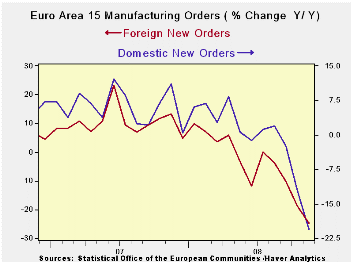 Global| Jan 22 2009
Global| Jan 22 2009E-Zone Orders Drop Sharply...Again
Summary
E-Zone orders are dropping sharply in November. Based on some more topical country level reports, it is not surprising that the EMU orders series made another sharp fall – and more those lie ahead. Today, in fact, the UK CBI survey of [...]

E-Zone orders are dropping sharply in November. Based on some
more topical country level reports, it is not surprising that the EMU
orders series made another sharp fall – and more those lie ahead.
Today, in fact, the UK CBI survey of industry posted another sharply
weaker result with its up minus down diffusion index falling to -48 in
January compared to -35 in December. That’s right, in January.
Diffusion data are generally out a month or more ahead of the actual
underlying series that they describe and, as such, they provide a road
map of where we are headed. Still, the variables themselves tell the
actual story of industry.
In November the EMU series is telling us of increased pain in
the zone. The carnage is widespread. For Germany, France, Italy and the
UK Yr/Yr orders are dropping in November by 20% or more from November
of one year ago. In the quarter to date (Q4) the country level growth
rates for orders are more like a negative 50% at an annual rate
compared to Q3 2008.
The weakness is spread more or less equally across domestic
and foreign orders in the EMU series. Foreign orders are down by more
over 12-months but the drop in November is worse for domestic orders.
For the moment we are in the worst of the grip of the
downturn. As we admit this, the international banking crisis is not
getting any better. The ‘Dutch boys’ with their fingers in the dikes
are calling out for more recruits --for more stop-gap plans. Others are
crying out for a more permanent solution and for mindful attention to
what all this interventionism will mean for the future. The US has just
completed its transition to new leadership. Japan is eroding faster
after showing some resilience. The strength in the yen is finally
creating more distress there. The data from the industrial sector in
EMU are telling. The pressure on the financial sector is bad and it is
going to get worse. We were already in a financial mess before this
recession began. Now the recession is global in nature and it is going
to spawn and spread the usual credit mess that comes hand in hand with
recession- and this recession is severe. So be prepared, because things
will get worse... That is the main message from the day’s weak
industrial data in Europe.
| E-zone-13 and UK Industrial Orders And Sales | |||||||||
|---|---|---|---|---|---|---|---|---|---|
| Saar except m/m | Mo/Mo | Nov-08 | Oct-08 | Nov-08 | Oct-08 | Nov-08 | Oct-08 | ||
| Ezone Detail | Nov-08 | Oct-08 | Sep-08 | 3-Mo | 3-Mo | 6-mo | 6-mo | 12-mo | 12-mo |
| MFG Orders | -4.5% | -5.7% | -5.4% | -47.3% | -40.3% | -27.6% | -28.3% | -21.0% | -15.2% |
| MFG Sales | -0.9% | -1.9% | -1.9% | -17.0% | -17.0% | -10.5% | -8.6% | -2.6% | -1.7% |
| Consumer | 0.1% | 0.0% | -0.2% | -0.3% | -1.4% | -0.7% | -1.2% | -0.5% | -0.6% |
| Capital | -0.3% | -0.6% | -0.6% | -5.8% | -6.7% | -5.3% | -5.2% | -1.5% | -1.2% |
| Intermediate | -7.0% | -5.5% | -6.0% | -53.6% | -38.7% | -28.6% | -26.9% | -20.5% | -12.2% |
| Memo:MFG | |||||||||
| Total Orders | -4.5% | -5.7% | -5.4% | -47.3% | -40.3% | -27.6% | -28.3% | -21.0% | -15.2% |
| E-13 Domestic MFG orders | -7.0% | -5.5% | -6.0% | -53.6% | -38.7% | -28.6% | -26.9% | -20.5% | -12.2% |
| E-13 Foreign MFG orders | -3.5% | -6.9% | -5.9% | -48.9% | -46.5% | -30.3% | -32.3% | -24.8% | -18.9% |
| Countries: | Nov-08 | Oct-08 | Sep-08 | 3-Mo | 3-Mo | 6-mo | 6-mo | 12-mo | 12-mo |
| Germany (MFG): | -7.2% | -7.1% | -8.0% | -60.3% | -39.7% | -37.5% | -29.6% | -24.4% | -16.6% |
| France(Ind): | -5.7% | -11.8% | 0.6% | -50.8% | -55.2% | -33.7% | -38.5% | -25.5% | -18.8% |
| Italy (Ind): | -6.3% | -6.6% | -3.8% | -49.7% | -39.0% | -27.2% | -23.2% | -21.1% | -12.1% |
| UK (Engineering Ind): | -8.4% | -24.0% | 28.8% | -35.6% | -35.3% | -38.9% | -35.2% | -21.7% | -8.9% |
Robert Brusca
AuthorMore in Author Profile »Robert A. Brusca is Chief Economist of Fact and Opinion Economics, a consulting firm he founded in Manhattan. He has been an economist on Wall Street for over 25 years. He has visited central banking and large institutional clients in over 30 countries in his career as an economist. Mr. Brusca was a Divisional Research Chief at the Federal Reserve Bank of NY (Chief of the International Financial markets Division), a Fed Watcher at Irving Trust and Chief Economist at Nikko Securities International. He is widely quoted and appears in various media. Mr. Brusca holds an MA and Ph.D. in economics from Michigan State University and a BA in Economics from the University of Michigan. His research pursues his strong interests in non aligned policy economics as well as international economics. FAO Economics’ research targets investors to assist them in making better investment decisions in stocks, bonds and in a variety of international assets. The company does not manage money and has no conflicts in giving economic advice.






